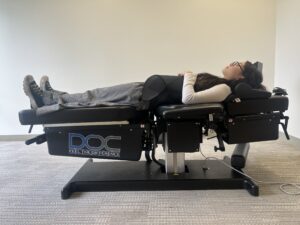Frozen shoulder, also called adhesive capsulitis, is a painful and disabling condition of unclear cause in which shoulder movement becomes limited.
What is Frozen Shoulder?
Adhesive capsulitis or frozen shoulder is a condition characterized by stiffness and pain in the shoulder joint. Signs and symptoms typically begin gradually, and over a period of worsening, they get better and in the end they resolve, usually within one to three years. The current consensus definition of a frozen shoulder by the American Shoulder and Elbow Surgeons is “a condition of uncertain etiology characterized by significant restriction of both active and passive shoulder motion that occurs in the absence of a known intrinsic shoulder disorder.”
The condition is called ‘frozen’ shoulder because the more pain that is felt, it is less likely that the shoulder will be used. And the lack of use causes the shoulder capsule to thicken and tighten even more, making the shoulder movements limited, leading to ‘freezing’ the shoulder in its position.
The condition develops in three stages:
- Freezing (painful) – gradual onset of diffuse shoulder pain and losing the range of motion of the shoulder. Lasts 6 weeks to 9 months.
- Frozen (stiffening) – progressive loss of the range of motion. Painful symptoms may improve. Lasts 4 to 6 months
- Thawing (recovery) – gradual improvement of the symptoms. The full strength and motion may be regained in 6 months to 2 years.
The condition is rarely seen in young patients, and most commonly occurs in people between 40 to 60 years old, and it is more often in women than men.
Why Does It Occur? What Are The Risk Factors?

Frozen shoulder occurs when the shoulder joint capsule becomes thick, stiff, and inflamed and adhesions develop. In many cases there is less joint fluid too.
What is the main frozen shoulder cause? Most commonly it is due recent injury or surgery that keeps the shoulder from moving.
People with diabetes mellitus have higher risk of being affected by this condition, in fact, 10% to 20% of patient with diabetes will develop it. Also they tend to have a greater degree of stiffness, which lasts longer.
Other diseases and conditions related to adhesive capsulitis are: heart disease, stroke, Parkinson’s disease, hyperthyroidism, hypothyroidism, tuberculosis, some drugs (for example protease inhibitors, fluoroquinolones, antiretrovirals), autoimmune diseases etc.
Younger patients and patients with diabetes are more likely to develop contralateral adhesive capsulitis too.
How Do I Know If I Have It?
Main symptoms are pain and loss of motion and are divided in three frozen shoulder stages:
- Freezing – shoulder becomes painful and range of motion is limited.
- Frozen – shoulder becomes stiffer, the pain begin to diminish.
- Thawing – range of motion begins to improve.
Characteristics of the pain are:
- Diffuse
- Sharp
- Worse at night and in cold
- Worse with moving
Other symptoms include the inability to sleep on the affected side, localized discomfort, fatigue and weight loss due to lack of sleep.
How Is It Diagnosed?

The diagnosis mainly is based on medical history and physical examination, as the RTG scans looks normal.
During the physical examination doctor will check both active and passive range of motion. When there is a lot of pain, some numbing medicine may be administrated prior the examination. Limited passive range of motion is a critical element in establishing the diagnosis.
Imaging tests, such as X-ray, MRI, CT and ultrasound are rarely required.
Best Treatment Options
The nature of the condition is to gets better over the time, so the focus of the treatment is to control the pain and restore strength and motion of the shoulder. Treatment involves medication, physical therapy, transcutaneous electric nerve stimulation and possibly surgery. For best results, often medications and physical therapy are combined together.
Medications are used to treat the pain and swelling. These include acetaminophen, NSAIDs (ibuprofen), corticosteroids or steroid injections.
Physical therapy is focused on saving the motion and improving the range of motion, it consists of stretching and motion exercises specially designed to improve the range of motion. It is very important after the end of treatment with a physical therapist to continue to work out at home.
Transcutaneous electric nerve stimulation works like pain reliever through blocking the neural signals.
Surgery is last treatment option and is only approached when conservative methods don’t work.
Are There Any Natural Treatments?
If you prefer natural treatments over conventional medicine, you can turn to simple methods for pain relieving, chiropractic care or acupuncture.
Natural methods of pain relieving include using cold and hot compresses on the shoulder and putting hot pads under the affected shoulder before sleeping, this will improve the pain and swelling.
You can also use some of the natural painkillers like spicy foods, peppermint oil, epsom salt, cannabis oil, boswellia extract, turmeric etc.
A chiropractor using spinal manipulation and active release technique can improve the mobility of the shoulder by loosening the muscles of the neck and back.
Acupuncture is considered to be effective in coping with the pain caused by frozen shoulder. It is an ancient Chinese method used to treat the pain using very fine needles. To experience the benefits of acupuncture, schedule an initial consultation for evaluation and first treatment.
Although Adhesive capsulitis or frozen shoulder sound painful and scary, over time it will get better for you with the right guidance.
To find out if you are a candidate for frozen shoulder treatment and to get to the root cause of pain and discomfort, schedule an initial consultation, including a comprehensive evaluation and first treatment.
Keep learning about shoulder pain treatment options with these helpful resources.
Best Shoulder Pain Treatment In San Francisco
Dry Needling For Shoulder Pain
How to Relieve Nerve Pain in the Shoulder Blade
Best Neck Pain Treatment In San Francisco




